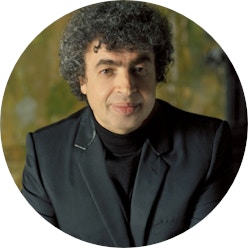
Semyon Bychkov
30 de noviembre de 1952 - Saint Petersburg (Russia)
© Sheila Rock
Acerca de
Semyon Bychkov was born in Soviet Russia to a Jewish family: his father was a scientist and his brother is Yakov Kreizberg, himself a conductor of great character. At the age of five Bychkov received his first piano lessons and within a year he was giving public performances. He entered the Glinka Choir School where choral singing and musical studies were combined with the usual academic disciplines. From the age of thirteen he also studied choral conducting (as well as being an enthusiastic volleyball player). His first experience of orchestral conducting came when he was seventeen, and of opera the following year, 1970, when he also entered the Leningrad Conservatory. As soon as he could he joined the conducting class of the legendary teacher Ilya Musin. He gave his first orchestral performance, of Falla’s El sombrero de tres picos, at the Conservatory when nineteen; this was followed by twenty performances of Tchaikovsky’s opera Eugene Onegin in the Conservatory’s theatre, for which he was paid two roubles fifty kopecks per performance.
Having won first prize in the Rachmaninov Conducting Competition in 1973, as Bychkov neared his graduation from the Leningrad Conservatory in 1974 he was invited to conduct the Leningrad Philharmonic, a rare honour for a student. However the date was first postponed and then cancelled as the Soviet authorities became aware that the young Jewish musician, while not an active dissident, was not acceptable politically. ‘It was clear that doors would be closed to me,’ Bychkov recalled. ‘I had to get out.’ Much to his surprise he was granted an exit visa a month after his application and in 1975 he found himself in America, where he was to remain for the next fourteen years.
Bychkov enrolled as a conducting student at the Mannes College of Music in New York, where he was appointed chief conductor of the student orchestra after winning the Gino Marinuzzi Conducting Competition in Italy. In 1980 he was named chief conductor of the Grand Rapids Symphony Orchestra, with whom he stayed for five years, before taking up the same post with the Buffalo Philharmonic Orchestra, with whom he stayed for four seasons, until 1989. While these appointments enabled him to develop steadily as a conductor, he was also thrust into the eye of the international musical public through a series of short-notice substitutions. In the autumn of 1984, following his formal European debut conducting at the Aix-en-Provence Festival, he took the place of Bernard Haitink with the Concertgebouw Orchestra in Amsterdam, followed shortly afterwards by an appearance with the New York Philharmonic Orchestra, substituting for Rafael Kubelík. At the start of the following year Bychkov made his debut with the Berlin Philharmonic Orchestra, replacing Riccardo Muti at two days’ notice, conducting Prokofiev and Shostakovich: so successful were these performances that the orchestra immediately re-engaged him for future appearances. In addition he signed a contract with Philips and recorded the Symphony No. 5 of Shostakovich with the Berlin Philharmonic, a disc that received high critical praise. This was to be followed by further recordings.
In 1989 Bychkov left Buffalo to become chief conductor of the Orchestre de Paris in succession to Daniel Barenboim. He remained in Paris until 1998, combining this post with appointments as principal guest conductor of the St Petersburg Philharmonic Orchestra (1990–1994), and of the Maggio Musicale in Florence (1992–1998), where he conducted productions of Schubert’s Fierrabras and Shostakovich’s Lady Macbeth of Mtsensk, each of which was awarded the prestigious Italian Abbiati Prize. During the 1990s Bychkov was a frequent conductor of opera, appearing in Chicago, Paris, Hamburg, Munich, Milan and Vienna as well as at the Aix-en-Provence Festival. From the beginning of the 1997–1998 season he has worked in Cologne as chief conductor of the West German Radio Symphony Orchestra, with whom he has toured to the Far East as well as North and South America. Between 1999 and 2002 he also served as chief conductor at the Dresden State Opera, where he has led works by Wagner, Richard Strauss and Shostakovich.
Bychkov’s interpretative style is marked by a rich sense of lyrical line and an exuberant rhythmic pulse, which he combines with wide-ranging contrasts in dynamics and tone colour. He has perhaps yet to fulfil completely the promise of his earlier years as an international conductor, and after a number of excellent recordings he has been less active in the recording studio. Among his most notable recordings are works by Dutilleux, Rachmaninov, Shostakovich, Richard Strauss and Tchaikovsky. By temperament and training Bychkov is able to deliver excellent performances of the Russian repertoire, as well as dramatic realisations of opera. He has also recorded extensively with the Labèque sisters, one of whom, Marielle, is his wife.

